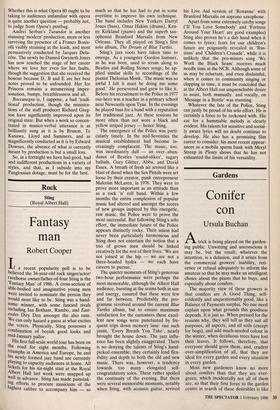Rock
Sting
(Royal Albert Hall)
Fantasy man
Robert Cooper
If a recent popularity poll is to be believed the 34-year-old rock singer/actor/ racehorse owner/father-of-four Sting is the `Fantasy Man' of 1986. A cross-section of able-bodied and imaginative young men were invited to nominate the person they would most like to be. Sting was a hand- some winner, with some fancied rivals including Ian Botham, Rambo, and East- ender Diry Den amongst the also rans. We can only hazard a guess at what excites the voters. Physically, Sting possesses a combination of boyish good looks and mid-January pallor. His first full-scale world tour has been on the road for eight months. Following triumphs in America and Europe, he and his newly formed jazz band are currently playing to capacity audiences at home. All tickets for his six-night stint at the Royal Albert Hall last week were snapped up well in advance. Sting has made painstak- ing efforts to procure musicians of the highest calibre to accompany him — so much so that he has had to put in some overtime to improve his own technique. The band includes New Yorkers Darryl Jones (bass), Omar Hakim (drums), Ken- ny Kirkland (piano) and the superb sax- ophonist Branford Marsalis from New Orleans. They all played on Sting's first solo album, The Dream of Blue Turtles.
Sting's jazz roots have taken time to emerge. As a youngster Gordon Sumner, as he was born, used to strum along to Beatles and Rolling Stones songs; he ap- plied similar skills to recordings of the pianist Thelonius Monk. The music was so awful I felt it must be doing me some good.' He persevered and grew to like it. Before his recruitment to the Police in 1977 our hero was a teacher in a primary school near Newcastle upon Tyne. In the evenings he played bass for a band with a reputation for traditional jazz. At these sessions he more often than not wore a black and yellow striped jersey — hence Sting.
The emergence of the Police was parti- cularly timely. In the mid-Seventies the musical establishment had become in- creasingly complacent. The music, too, was inordinately dull — an over - abun- dance of Beatles `sound-alikes', sugary ballads, Gary Glitter, Abba, and David Essex. A breath of fresh air arrived like a blast of diesel when the Sex Pistols were set loose by their creator, punk entrepreneur Malcolm McLaren, in 1976. They were to prove more important as an attitude than as a rock 'n' roll band. Within a few months the entire complexion of popular music had altered and amongst the scores of new groups inspired by this energetic, raw music, the Police were to prove the most successful. But following Sting's solo effort, the immediate future of the Police appears distinctly rocky. Their union had never been particularly harmonious and Sting does not entertain the notion that a trio of grown men should be linked creatively for the rest of their lives: 'We are not joined at the hip — we are not a three-headed hydra — we each have careers to pursue.'
The quieter moments of Sting's generous two-hour performance were perhaps the most memorable, although the Albert Hall audience, bursting at the seams both in size and energy, ensured that these were few and far between. Predictably the pro- gramme revolved around the current Blue Turtles album, but to ensure maximum satisfaction for the customers these excel- lent new songs were punctuated by fre- quent trips down memory lane: one such jaunt, 'Every Breath You Take', nearly brought the house down. The jazz influ- ence has been slightly exaggerated. There is no denying the talents of Sting's hand- picked ensemble; they certainly lend flex- ibility and depth to both the old and new music. There was, however, a tendency towards too many elongated self- congratulatory solos. These rather spoiled the continuity of the evening. But there were several memorable moments, notably when Sting, with acoustic guitar, revived his Live Aid version of 'Roxanne' with Branford Marsalis on soprano saxophone.
Apart from some extremely catchy songs (`If You Love Somebody' and 'Fortress Around Your Heart' are good examples) Sting also proves he's a dab hand when it comes to lyrics; fears for our children's future are poignantly revealed in 'Rus- sians' and 'Children's Crusade', while it is unlikely that the pro-miners song 'We Work the Black Seam' receives much needle time at the NCB. Although some of us may be reluctant, and even disdainful, when it comes to community singing or clapping in time, it must be conceded that at the Albert Hall our unquenchable desire to assist, both manually and vocally, on `Message in a Bottle' was stunning.
Whatever the fate of the Police, Sting can justly be proud of his solo effort. He is certainly a force to be reckoned with. His ear for a hummable melody is clearly evident. His talents for sensitive and social- ly aware lyrics will no doubt continue to develop. He also has a promising film career to consider: his most recent appear- ances as a mobile sperm bank with Meryl Streep in Plenty shows that he has not exhausted the limits of his versatility.














































 Previous page
Previous page